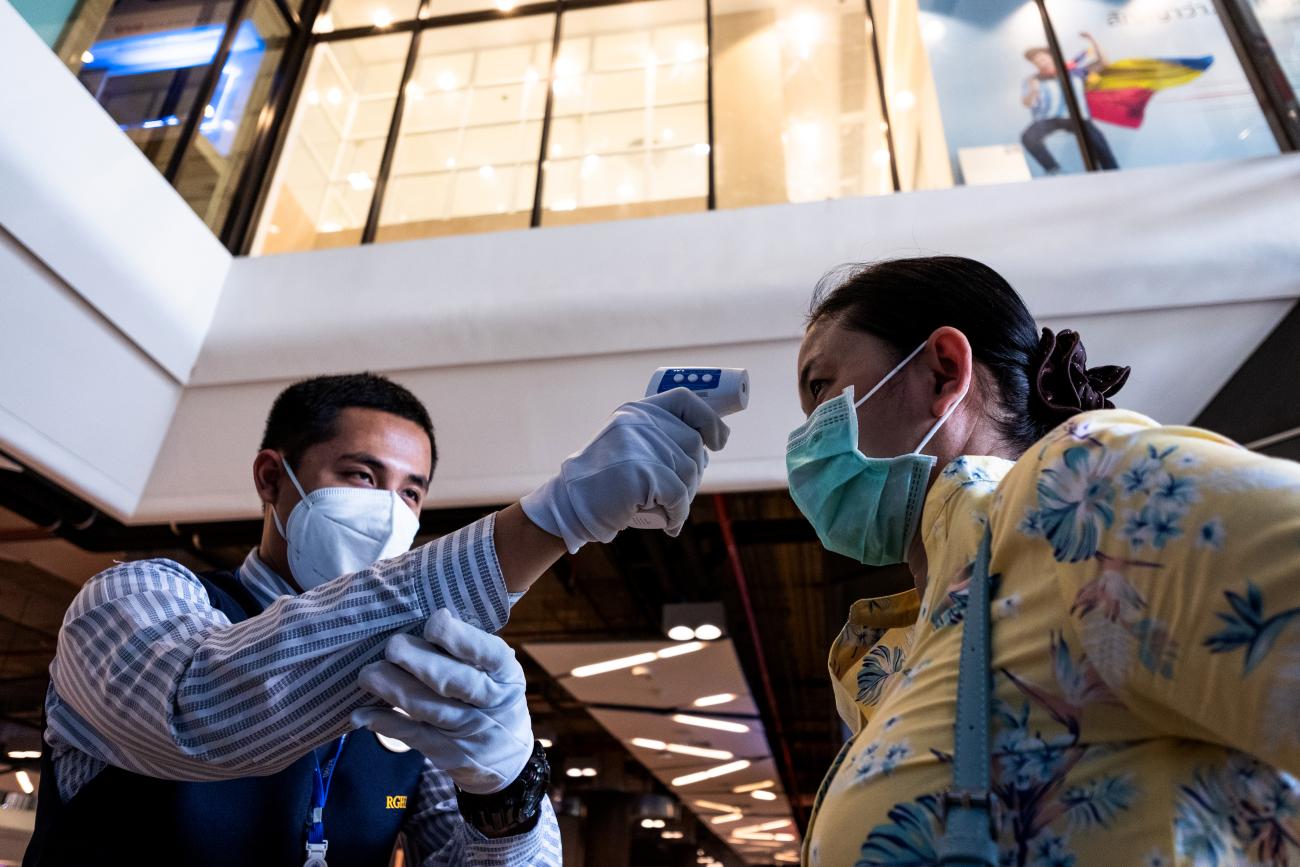COVID-19 is an unprecedented global health crisis with major social and economic impacts. The UN Country Team is supporting the Government and the people of Thailand to comprehensively address this crisis with a whole-of-government and whole-of-society response. To contain the transmission of COVID-19 and stop the pandemic, the public health response needs to be integrated with the social and economic interventions and with the collaboration of Government, civil society and the private sector. The focus is on those at risk of being left behind – women, the elderly and youth, workers in small and medium enterprises and the informal sector, and vulnerable and marginalised groups such as the disabled, LGBTI, those living with HIV, the stateless, ethnic minorities,migrants, refugees and the homeless.
To ensure an integrated policy response, the UN Country Team in Thailand has prioritized four broad areas of intervention, in line with the UN Framework, to ensure progress towards the 2030 Agenda to advance the SDGs. In protecting hard-earned development gains and progress, the focus is on containing COVID-19, addressing the immediate knock-on effects, supporting policy responses for long-term inclusive recovery and building back better to achieve the SDGs. The UN Secretary General emphasises that the international community requires ‘Shared Responsibility, Global Solidarity’ for an effective response to COVID-19. It is vital that this is underpinned by a human rights-based and gender responsive approach.
1. Support to protect the Government’s public health services and strengthen its capacity to respond to COVID-19.
The UN’s expertise at the national, regional and global levels is focused on supporting the government with comprehensive health strategies to:
- Support decision-making based on analysis of epidemiology of the pandemic and provide comprehensive technical guidance on all aspects of the epidemic response.
- Expand and strengthen laboratory capacity for testing and surveillance.
- Support expansion and preparedness of health facilities at all levels to manage COVID-19 infection.
- Facilitate research in therapeutics and vaccine development.
- Prioritize risk communications and messaging.
- Support continuation of the essential health care services whilst managing risk of infection.
2. Support the Government’s scale up of social protection measures to help people cope with adversity and secure lives, livelihoods and the economy.
The UN with its focus on leaving no one behind is providing policy advice to comprehensively deal with the immediate effects of the crisis. The strategy is to:
- Provide technical assistance, including actuarial support, to offer policy solutions to scale up social protection, covering both contributory and non-contributory benefits, including for the most vulnerable and marginalized.
- Explore with government suitable medium-term social protection options to address the knock-on effects for the hardest hit people and the most adversely affected sectors of the economy, including migrant workers and workers in the informal sector.
- Invest in awareness-raising, psychosocial support, using local authorities and civil society networks at the community level to support the most vulnerable groups.
3. Inform Royal Thai Government’s policies and programmes to build back better towards SDGs.
The UN in partnership with policy think tanks is investing in generating evidence to deepen analysis of the socio-economic impact of COVID-19 across Thailand. These are designed to safeguard the countrywide progress towards SDGs and support a pathway to an inclusive and sustainable recovery that protects jobs, supports small and medium-sized enterprises, and informal sector workers, particularly amongst the most vulnerable groups. The strategy is to:
- Undertake rapid assessment surveys to analyze the impact on labor market employment and relevant economic sectors, focusing on vulnerable and marginalized groups including domestic workers, migrants, women, youth, and the elderly.
- Monitor the government’s fiscal stimulus packages to track its impact and inform macro-economic policies to support an inclusive recovery and achievement of the SDGs.
- Analyze the implications with a focus on poverty, food systems, education, health, social protection and protection against violence, exploitation and abuse.
- Partner with most impacted provinces to build the resilience of local government systems and other actors, including promoting the adoption of Business Continuity Plans in Local Government authorities and SMEs for example.
- Partner with civil society organizations to understand the impact of the COVID-19 crisis and community response on ethnic groups (including statelessness persons), LGBTI, young people and people with HIV and People with Disabilities.
- Collaborate with the Ministry of Social Development and Human Security to make the prevention and redress of violence against women a key part of the national response plans for COVID-19, including increasing investment in hotline services and creating safe ways for women to seek support.
- Analyse and provide gender-sensitive policy options and measures to support an inclusive and sustainable recovery and achieve the SDGs.
- Advocate to ensure the broader development agenda and the SDGs are not undermined in the response, with a focus on the interconnectedness of environment, biodiversity and climate change goals, to a resilient recovery.
4. UN amplification of messaging to vulnerable populations while promoting solidarity in response to COVID-19.
The messaging and advocacy on the health, social, economic and psychological dimensions of the pandemic is targeting the most vulnerable and hardest to reach such as migrants and refugees whilst also promoting social cohesion. The communications campaign is monitoring trends and the national mood informed by big data analysis. The strategy includes:
- Communicate and amplify risk communication messages on COVID-19 targeted at vulnerable and high-risk populations in Thailand, using innovative and community-oriented approaches and communications that empower people with knowledge to protect themselves and others.
- Amplify messaging of social and psychological dimensions of social distancing and countering trends of gender-based violence and stigmatization based on social media analysis.
- Leveraging partnerships, including with civil society, communities and businesses, to promote solidarity and secure meaningful contribution to the COVID-19 response.



















